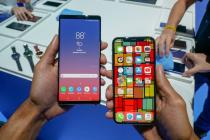For many years, Apple's financial results have largely depended on iPhone sales. Now, however, the company is disclosing revenue from app sales, music and other services, and it turns out that the App Store, iTunes, Apple Pay and iCloud bring in as much as a smartphone.
“Apple's results are really impressive when compared with the results of other public corporations. The company has excellent prospects.”
Total revenue for the quarter increased by 7.2% to $45.41 billion. Profits jumped 12% to $8.72 billion. After the release of quarterly results, Apple shares soared 5%.
The company was able to increase sales in the services segment, despite many problems. Apple was forced to contend with the halt of movie sales in China, the shrinking market share of iTunes in the US, and the failure of the music streaming service to compete with Spotify.
Apple is still keeping the main sources of income in the services segment under wraps. It publishes only the cumulative payouts to app developers every year, and in June said Apple Music subscribers had reached 27 million. However, the tech giant does not separate earnings from AppleCare, Apple Pay, iTunes, iCloud and other services into separate items.
Much of the growth in the services segment is driven by the size and quality of Apple's user base. Currently, there are more than 1 billion different devices of the company around the world. Usually they are bought by wealthy consumers who download a large number of applications on their gadgets and buy space in the cloud to store photos. According to App Annie, the App Store's revenue is almost double that of the competing Google Play store.
To some extent, Apple benefits from general consumer trends. A growing number of customers are ditching cable channels in favor of video streaming services such as Netflix, HBO Now and Hulu. Many subscribe to them through the App Store (Apple receives 15% of the amount of each contract concluded).

The company said subscriptions rose 12% over the past 90 days to 185 million. Speaking to analysts, Chief Financial Officer Luca Maestri attributed some of the growth to simplifying App Store purchases by adding more payment options (such as Alipay in China). ).
Unfortunately, it hasn't been without problems. In China, the government banned the sale of films and books because they violated local regulations for such products.
In addition, Apple has come under significant public scrutiny for removing certain apps from the Chinese version of its store, such as New York Times, which allowed users to bypass local censorship.
Apple's music streaming service is still lagging behind Spotify. In June, the latter reported an increase in the number of paid subscriptions to 60 million. iTunes movie rentals and sales in the US have suffered from fierce competition from Comcast (NASDAQ : CMCSA) and Amazon.com (NASDAQ : AMZN) (the service’s share has decreased from more than 50 % in 2012 to 20% this year).
The creator of the iPhone is trying to differentiate its offerings by offering original content to users. In June, the company released the Planet of the Apps reality show, and plans to add Carpool Karaoke to it next week. Apple recently hired two well-known Hollywood producers to create original content. During a press conference, Tim Cook stated:
“Let's see how the development in this area will go. It is of great interest to the company.”
The growth in services over the past decade is impressive when you consider that Steve Jobs didn't see much point in building an app store. The first iPhone appeared without it, and Jobs initially wanted to offer only Apple services, but company employees and outsiders were able to convince him of the benefits of the App Store.
Today, the bulk of the store's revenue comes from app sales. Users spent $28.5 billion on them in 2016. Apple's share was 30%, or about $8.5 billion.
Prepared by Taya Aryanova














